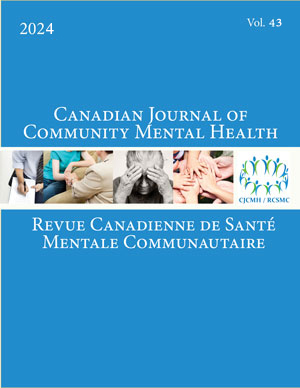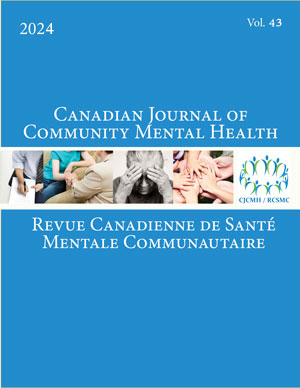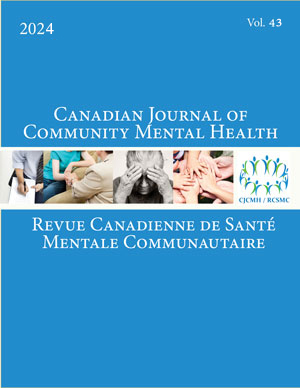Volume 26 • Number 1 • April 2007
OPEN ACCESS
OPEN ACCESS
OPEN ACCESS
OPEN ACCESS
Cet article présente une analyse de contenu des articles publiés dans la Revue canadienne de santé mentale communautaire (RCSMC) de 1982 à 2006. Cette analyse vise à dresser un portrait de l'ensemble des articles, à dégager les grandes tendances notables au fil du temps et à procurer des pistes de réflexion pour les futures publications de la RCSMC. Différentes dimensions sont présentées et discutées dans une perspective d'évolution temporelle, soit l'identité et la provenance des rédacteurs et rédactrices et des auteurs les plus productifs, la langue de publication, l'affiliation des premiers auteurs des articles, les thématiques des numéros spéciaux et des suppléments, le type et le domaine d'intérêt des articles et les mentions de financement pour des recherches empiriques publiées dans la RCSMC. Ces résultats sont discutés à la lumière des connaissances historiques et actuelles en santé mentale communautaire.
OPEN ACCESS
This article presents a content analysis of articles published in the Canadian Journal of Community Mental Health (CJCMH) between 1982 and 2006. The analysis aims to provide an overall description of the articles, identify the major trends over time, and suggest future directions for CJCMH issues. The article highlights the development over time of various dimensions of CJCMH's content: identity and location of CJCMH's editors and most productive authors, language of publication, affiliation of the articles' first authors, themes of special issues and supplements, types of articles and areas of interest covered, and source of financing for empirical studies published in CJCMH. These findings are discussed in the context of the history and current knowledge of community mental health.
OPEN ACCESS
OPEN ACCESS
OPEN ACCESS
OPEN ACCESS
OPEN ACCESS
This article describes recent work to support recommendations for improving Ontario's system of housing for people with serious mental illness. This multifaceted project engaged stakeholders in discussions concerning strategies for improving the system based on (a) values that underlie housing programs, (b) evidence of effective housing practices, (c) the current status of the system, and (d) international practices for monitoring community mental health systems. Stakeholders reviewed summaries of the work and discussed implications for improving the provincial system of housing and supports. Recommendations are made for improving the system, focusing on both regional and provincial level actions.
OPEN ACCESS
Cet article présente les résultats d'une analyse visant à déterminer de quelle façon les équipes d'intervention jeunesse (ÉIJ), une initiative expérimentale de coordination de services implantée par le ministère de la Santé et des Services sociaux du Québec en 2003, facilitent l'élaboration des plans de services individualisés (PSI). L'analyse, de type qualitatif, s'est fortement inspirée de la méthode de la théorisation ancrée (« Grounded Theory ») (Glaser & Strauss, 1967). Les données ont été recueillies à l'aide d'entretiens semi-structurés, administrés à une vaste gamme de participants directement impliqués dans l'initiative. Les résultats de l'analyse soulignent le rôle central joué par le coordonnateur ou la coordinatrice des ÉIJ dans l'élaboration des PSI de même que l'importance de la structure et des ressources procurées par les équipes.
OPEN ACCESS
This study tested the feasibility of a surveillance system of the media's portrayal of suicide and mental illness in Nova Scotia. The general public was asked to monitor nonfiction media in the province using standardized checklists over 6 months. The checklists were available on the World Wide Web and various locations in the community, and participants could identify either appropriate or inappropriate coverage. The researchers received 414 submissions covering 366 media items (304 on mental illness and 62 on suicide) during the 6-month survey: 311 from print media and 55 from radio and television. Ratings showed good agreement. On most dimensions, the majority of media items were of good quality. However, details about getting appropriate help were included in only 8.5% of media reports. Items covering suicide were 3.5 times as likely to contain inappropriate content as those on mental illness (95% CI = 1.5–8.0). These results are guiding the development of media guidelines in Nova Scotia. The study also showed that the present methodology can be used to monitor any subsequent effect on the portrayal of mental illness and suicide in the media.
OPEN ACCESS
Although the length and quality of life for people living with HIV/AIDS has improved dramatically in recent years because of antiretroviral medications, these individuals still need to make significant psychosocial adjustments in order to improve their quality of life and the HIV trajectory. Mental health professionals can play an important role in this process. The present study investigated the experiences of 12 gay men living with HIV or AIDS who received counselling and peer support services. The findings are drawn from a larger phenomenological study that explored participants' experiences of receiving counselling and peer support services. This paper offers a description of these services and the participants' reactions. The authors report several important considerations for mental health professionals in relation to counselling and peer support programs.
OPEN ACCESS
L'objectif de cette étude exploratoire était de comparer deux groupes d'hommes âgés quant à leur expérience d'aidant de leur conjointe et à leur perception des services: des conjoints dont l'épouse souffrait de la maladie d'Alzheimer (n = 20) et des conjoints d'une épouse en perte d'autonomie fonctionnelle (n = 23). Les résultats démontrent que les difficultés liées à l'expérience d'aidant sont le plus souvent communes aux deux groupes et sont surtout d'ordre psychologique. Ces difficultés concernent notamment la captivité liée au rôle d'aidant, les changements de personnalité de l'épouse nécessitant des changements d'attitudes et l'abandon des activités sociales. Plusieurs conjoints ont souligné l'accès limité aux services, particulièrement le peu de services de présence-surveillance et d'aide psychosociale, le manque de continuité dans les services et le fait que leurs propres besoins soient peu reconnus par les intervenants et intervenantes. Des analyses contrastées considérant le niveau de détresse psychologique indiquent que les conjoints d'une épouse en perte d'autonomie fonctionnelle ayant un faible niveau de détresse psychologique reçoivent généralement plus de services que tous les autres conjoints âgés. Des pistes pour améliorer l'offre de services sont proposées.
OPEN ACCESS
While assertive community treatment (ACT) teams are now an important resource for over 3,300 people living with severe and persistent mental illness in Ontario, ACT teams have had limited success reducing the unemployment rate of consumers. Results from the most recent survey of Ontario ACT teams show the unemployment rate stuck at 77% (Ministry of Health and Long-Term Care, ACT Technical Advisory Panel, 2006). This article reviews the characteristics and service outcomes reported by ACT teams in Ontario and explores the paradox of impressive outcomes of reduced hospitalization and improved housing tenure alongside limited progress on the employment front. It also examines the plans of one organization (Canadian Mental Health Association, Toronto Branch) to improve employment results for consumers of its ACT teams.
OPEN ACCESS
OPEN ACCESS










